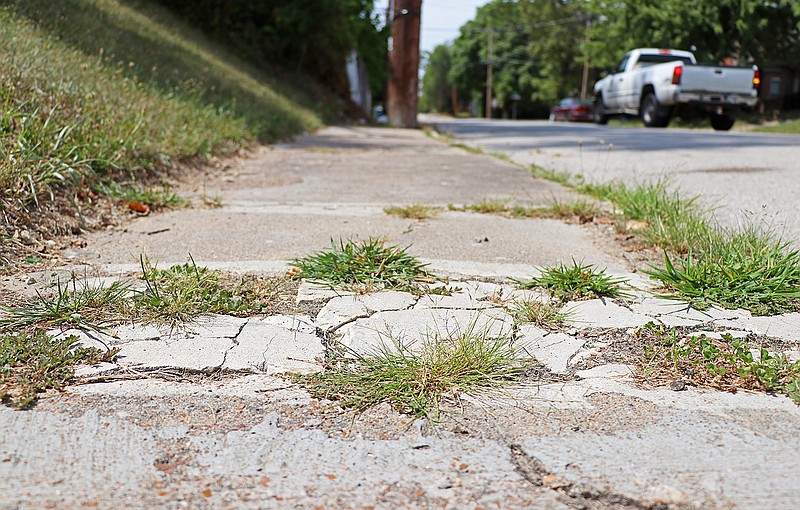The Jefferson City Public Works and Planning Committee on Thursday moved to submit two substitute sidewalk repair bills, splitting the dimension requirement from the sidewalk repair stipulations, to the Jefferson City Council.
Current city code allows an offset of 1.5 inches in the height of sidewalks sections. The council has considered a bill that would require adjoining property owners to repair sidewalks when a vertical displacement - holes or defects - of a quarter of an inch exists within any sidewalk.
City staff has offered a revised proposal that removes all references to the quarter-inch offset and changes it to "defects that create a dangerous or hazardous condition," Jefferson City Engineer David Bange said. The language change would be more open-ended and increase the ability to defend areas where measurements may not be exact but there is a trip hazard, he added.
"What those changes do for us - first, when we're talking about the displacement, it puts us in a situation where someone might call us and say, 'Hey, there's an offset in my sidewalk,'" Bange said. "We'll go out, and we'll measure the offset, and it's an inch and a quarter. That doesn't violate the city's code, and so it doesn't direct the staff in any way to do anything about that. And yet that offset is outside of what is allowable by ADA."
Vertical displacements that are deemed dangerous would be determined on a case-by-case basis by staff under the substitute sidewalk bill, Jefferson City Public Works Director Matt Morasch said.
"There's not a set definition," he said. "We just have to know it when we see it."
Defective sidewalks that are replaced must be reconstructed in compliance with the city's standard drawings and style. Replacement materials should also be similar to the current sidewalk, according to the memorandum. If a sidewalk or the curb requires a ramp, that work would be completed by the owner.
The committee requested the city's legal department separate the displacement change bill from the repair and ramp additions for discussion.
The council held off on voting on the originally proposed sidewalk bill last month. The bill is on the council's informal calendar, and it will expire after three meetings if the council does not take action on it. The item is set to expire Oct. 7.
The substitute bills would not change the duty of abutting property owners, which has been in the city code since 1891, Bange said.
Morasch said the language is similar to other city codes in the state including Columbia, Joplin, Kirkwood and Springfield.
Ward 4 Councilman Ron Fitzwater said he did not support the ambiguous language of the substitute bill, which could cause further frustration from residents. The city and state have sidewalks within the city that are not in compliance and code enforcement is an issue, he added.
At the Aug. 19 council meeting, residents and property owners said the quarter of an inch change would be a burden.
"People are just tired of us telling them what to do when we don't even live up to what we currently have," Fitzwater said. " I think until we live up to what we currently have on the books, we shouldn't be looking at more regulation for the citizens of this community."
Jefferson City Operations Division Director Britt Smith said the city has been in discussion with the state to address those issues.
The city owns the rights-of-way under the form of fee in trust, which means the city owns the property "in trust for the benefit of the public," City Counselor Ryan Moehlman previously said. The city is responsible for maintaining the rights-of-way in a safe condition but can delegate that responsibility to adjoining landowners, Moehlman added.
If the sidewalk needs to be fixed, the city can fix it on residents' behalf and charge the cost of the repair to the abutting property owner by placing a special tax bill on the property's annual county tax bill, Moehlman said.
The City Council will discuss the substitute bills at its Oct. 7 meeting.
In other business Thursday, the committee recommended informing the council of a second request by Republic Services representatives to increase the cost for curbside recycling services and to amend Republic Services' contract with the city.
Lillian Kinard, Republic Services municipal manager, said the company in April had asked the council to consider an increase of $1 per home per month. That same request was made Thursday. A $1 increase would generate approximately $146,000, Kinard previously said.
The city is in its fourth year of a 10-year contract with the company.

